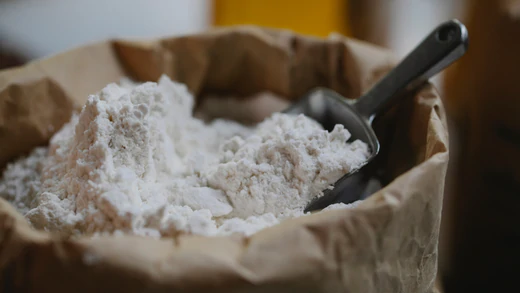If there’s one thing that can help you eat less and lose weight, it’s adding more protein to your diet. Protein has been proved to help you feel fuller for longer, speed up your metabolism, and even help you build muscle faster. Protein is the answer to your better body queries, but figuring out how to acquire more of it is a different story.
Protein is an essential component of organs, skin, and muscles. It is needed by the body to maintain and repair tissues. Children also need protein for growth and development.
Protein consumption is critical for good health. That is why protein’s Daily Value (DV) is set at 50 grams per day. Some researchers, however, suggest that many people should be eating much more than this.
A high protein diet has a number of possible health benefits, including weight loss, muscular growth, and overall health improvement. However, we understand that incorporating more protein into your diet might be difficult; after all, there are only so many turkey sandwiches one can consume!
The following ideas and dietary changes can help you acquire more protein without disturbing your daily routine.
Every meal should include some protein
Instead of trying to get all of your protein in one sitting, spread it out over several meals and snacks. It will make achieving your protein requirements much easier, as well as being healthier for your body.
Consume a diverse diet.
Experts advise that if you eat a diverse diet that includes healthy proteins like nuts, seeds, legumes, whole grains, and veggies, you’ll likely get all the protein you need. To put it another way, add some diversity to your diet by swapping out eggs for one of these high-protein breakfast options.
Try Protein-Rich Snacks like Cheese
Snacks can help you get more protein into your diet if you choose healthy options. Chips, pretzels, and crackers are just a few examples of low-protein snacks. A single cup (30 grams) of ordinary tortilla chips, for example, offers 142 calories but only 2 grams of protein.
A 1-ounce (28-gram) serving of cheddar cheese, on the other hand, contains 7 grams of protein, approximately 30 calories less, and 6 times the calcium. Furthermore, even in persons with high cholesterol, cheese does not appear to raise cholesterol levels significantly. In fact, several studies suggest that cheese may even be good for your heart.
For a healthy and enjoyable snack, try a cheese stick in between meals or combine your favorite type of cheese with whole-grain crackers, tomatoes, or sliced apples. Cheese platters in Delhi from CAARA are a wonderful option for modern snacks and serve as a good source of protein as well.
Eat Eggs instead of Cereals
Many breakfast foods, such as toast, bread, crackers, and cereals, are quite low in protein.
Even while oatmeal has more protein than most cereals, a normal 1-cup (240-gram) serving only has roughly 5 grams.
Three large eggs, on the other hand, contain 19 grams of high-quality protein, as well as vital minerals such as selenium and choline. Furthermore, eating eggs for breakfast has been shown in multiple studies to suppress hunger and keep you full for several hours, resulting in you eating fewer calories later in the day.
Almonds are extremely nutritious.
They’re high in magnesium, fiber, and heart-healthy monounsaturated fat while being low in easily digestible carbohydrates. In a 1-ounce (28-gram) serving, almonds include 6 grams of protein, making them a superior source of protein than most nuts.
And, despite the fact that a serving of almonds has roughly 170 calories, studies have shown that your body only receives about 133 of those calories since some fat isn’t digested.
You can top crushed or grated almonds on veggies or make pesto with almonds. Basil pesto especially tastes fabulous when made with almonds. You can find basil pesto in Delhi online as well. They are a good source of protein and will help you stay on the right protein diet which will be delicious as well.
Use Pine Nuts in your Pesto
Pine nuts, which are commonly used in pesto sauces, provide roughly 9 grams of protein per half-cup, making them an excellent choice for sandwich spreads and quinoa pasta.
If you add a handful of tree nuts to your pine nut pesto, such as almonds or walnuts, you may practically quadruple the amount of protein you get!
Increase your intake of full plant-based proteins.
Substitute quinoa and chia seeds for protein smoothies. Both are full-fledged plant-based proteins that are simple to include in snacks and meals: Quinoa can be used as a rice substitute, in homemade veggie burgers, or to “beef up” a vegetarian chili dish. Chia seeds can be used to make puddings, as an egg substitute in baked products, and as a smoothie ingredient.
Protein is made up of amino acids, nine of which are considered essential because your body cannot make them and must rely on your diet to receive them.
A complete protein is defined as a food that contains all nine essential amino acids. The issue is that many plant foods, such as lysine, are low in key necessary amino acids.
Quinoa, on the other hand, is an exception since it contains enough levels of all essential amino acids. As a result, it’s a fantastic source of protein. It provides more protein and is of higher quality than most cereals.
You can find the majority of these food items on CAARA online. If you ask us they make up for lovely and thoughtful Christmas Gift Hampers as well. We know the Delhiites are health freaks and what better than gifting them a hamper full of protein-rich food items like CAARA’s special sauces or assorted cheese gourmet hampers.


